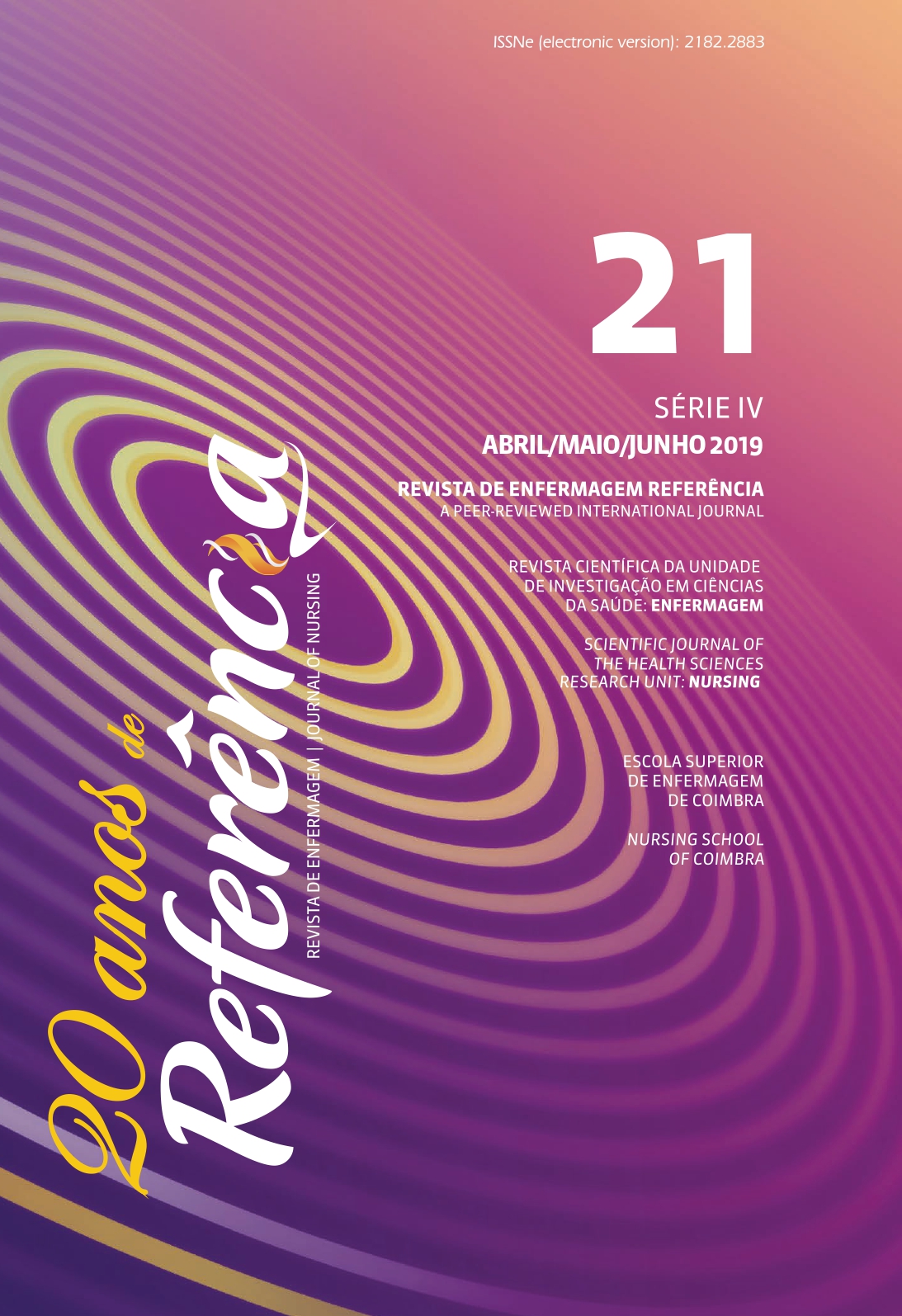Sexual function of kidney transplant recipients
DOI:
https://doi.org/10.12707/RIV19009Keywords:
kidney transplantation, sexuality, nursingAbstract
Background: Sexual dysfunction in people with chronic kidney disease is progressive and worsens with the deterioration of kidney functions. Although most people recover their sexual function after kidney transplantation, many sexual problems may persist after transplantation.
Objectives: To characterize the sexual function of kidney transplant recipients and analyze their association with demographic and clinical variables.
Methodology: A descriptive-correlational study was conducted with a sample of 139 kidney transplant recipients. Data were collected using a questionnaire for sociodemographic and clinical characterization, the International Index of Erectile Function, the Female Sexual Function Index, and the Beck Depression Inventory.
Results: The prevalence rate of sexual dysfunction in kidney transplant recipients was high (> 90%), and sexual desire was the most affected domain. Sexual function was influenced by age, depressive states, and the presence of a menstrual cycle.
Conclusion: Considering the prevalence of sexual dysfunction, nurses should integrate the research findings and promote sexual health in their daily clinical practice.
Downloads
References
Antonucci, M., Palermo, G., Recupero, S. M., Bientinesi, R., Presicce, F., Foschi, N., . . . Gulino, G. (2015). Male sexual dysfunction in patients with chronic end-stage renal insufficiency and in renal transplant recipients. Archivio Italiano di Urologia e Andrologia, 87(4), 299-305. doi: 10.4081/aiua.2015.4.299
Branco, F., Cavadas, V., Rocha, A., Vidinha, J., Osório, L., Martins, L., ... Fraga, A. (2013). Living versus cadaveric donor renal transplant recipients: A comparison on sexual function. Transplantation Proceedings, 45(3), 1066-1069. doi: 10.1016/j.transproceed.2013.03.011
Chilcot, J., Spencer, B. W., Maple, H., & Mamode, N. (2014). Depression and kidney transplantation. Transplantation, 97(7), 717-721. doi: 10.1097/01.TP.0000438212.72960.ae
Filocamo, M. T., Zanazzi, M., Li Marzi, V., Lombardi, G., Del Popolo, G., Mancini, G., . . . Nicita, G. (2009). Sexual dysfunction in women during dialysis and after renal transplantation. Journal of Sexual Medicine, 6(11), 3125-3131. doi: 10.1111/j.1743-6109.2009.01400.x
Gomes, A. L., & Nobre, P. (2012). The International Index of Erectile Function (IIEF-15): Psychometric properties of the Portuguese version. The Journal of Sexual Medicine, 9(1), 180-187. doi: 10.1111/j.1743-6109.2011.02467.x
Josephson, M. A., & McKay, D. B. (2013). Women and transplantation: Fertility, sexuality, pregnancy, contraception. Advances in Chronic Kidney Disease, 20(5), 433-440. doi: 10.1053/j.ackd.2013.06.005
Kettas, E., Çayan, F., Efesoy, O., Akbay, E., & Çayan, S. (2010). The effect of renal transplantation for end-stage renal disease on female sexual function and depression. Journal of Sexual Medicine, 7(12), 3963-3968. doi: 10.1111/j.1743-6109.2009.01670.x
Küçük, L., Türkmen, A., & Küçük, M. (2013). Sexual dysfunction in women after renal transplantation. Sexuality and Disability, 31(2), 155-166. doi: 10.1007/s11195-012-9282-4
Kurtulus, F. O., Salman, M. Y., Fazlioglu, A., & Fazlioglu, B. (2017). Effects of renal transplantation on female sexual dysfunction: Comparative study with hemodialysis and a control group. Transplantation Proceedings, 49(9), 2099-2104. doi: 10.1016/j.transproceed.2017.07.014
Mirone, V., Longo, N., Fusco, F., Verze, P., Creta, M., Parazzini, F., & Imbimbo, C. (2009). Renal transplantation does not improve erectile function in hemodialysed patients. European Urology, 56(6), 1047-1054. doi: 10.1016/j.eururo.2008.09.020
Muehrer, R. J. (2009). Sexuality: An important component of the quality of life of the kidney transplant recipient. Transplantation Reviews (Orlando, Fla.), 23(4), 214-233. doi: 10.1016/j.trre.2009.06.001
Noohi, S., Khaghani-Zadeh, M., Javadipour, M., Assari, S., Najafi, M., Ebrahiminia, M., & Pourfarziani, V. (2007). Anxiety and depression are correlated with higher morbidity after kidney transplantation. Transplantation Proceedings, 39(4), 1074-1078. doi: 10.1016/j.transproceed.2007.04.002
Özdemir, C., Eryilmaz, M., Yurtman, F., & Karaman, T. (2007). Sexual functioning after renal transplantation. Transplantation Proceedings, 39(5), 1451-1454. doi: 10.1016/j.transproceed.2006.11.024
Pechorro, P. S., Vieira, R. X., Calvinho, A. M., Poiares, C., Marôco, J., & Diniz, A. (2012). Validação cruzada da versão portuguesa do Índice de Funcionamento Sexual Feminino. Revista Internacional de Andrología, 10(3), 113-120. doi: 10.1016/S1698-031X(12)70064-X
Raggi, M. C., Siebert, S. B., Friess, H., Schremmer-Danninger, E., Thorban, S., & Dinkel, A. (2012). Sexual and relationship functioning before and after renal transplantation: A descriptive study with patients and partners. Scandinavian Journal of Urology and Nephrology, 46(6), 431-436. doi: 10.3109/00365599.2012.693132
Tomada, I., & Tomada, N. (2012). Disfunção sexual. In M. M. Silva, A. Duarte, J. Galo & N. Domingues (Eds.), Enfermagem em Urologia (pp. 51-55). Lisboa, Portugal: Lidel.
Van Ek, G. F., Krouwel, E. M., Van der Veen, E., Nicolai, M. P.., Ringers, J., Oudsten, B. L., . . . Elzevier, H. W. (2017). The discussion of sexual dysfunction before and after kidney transplantation from the perspective of the renal transplant surgeon. Progress in Transplantation, 27(4), 354-359. doi: 10.1177/1526924817731885
Vaz Serra, A. S., & Abreu, J. L. (1973). Aferição dos quadros clínicos depressivos: I. – Ensaio de aplicação do “Inventário Depressivo de Beck” a uma amostra portuguesa de doentes deprimidos. Separata de Coimbra Médica, 20, 623-644.
Wespes, E., Eardley, F. G., Giuliano, F., Hatzichristou, D., Hatzimouratidis, K., Moncada, I., . . . Vardi, Y. (2013). Guidelines on male sexual dysfunction: Erectile dysfunction and premature ejaculation. Arnhem, Netherlands: European Association of Urology.
Yavuz, D., Ozdemir Acar, F. N., Yavuz, R., Canoz, M. B., Altunoglu, A., Sezer, S., & Durukan, E. (2013).Male sexual function in patients receiving different types of renal replacement therapy. Transplantation Proceedings, 45(10), 3494-3497. doi: 10.1016/j.transproceed.2013.09.025






















